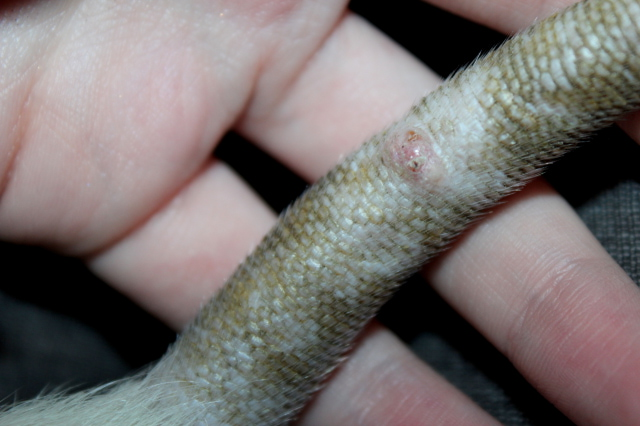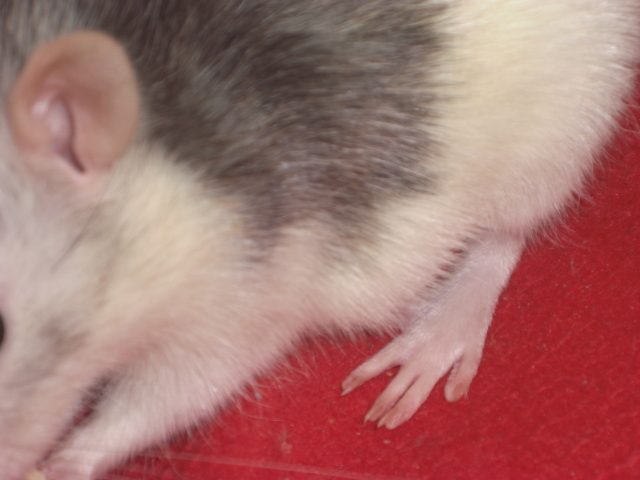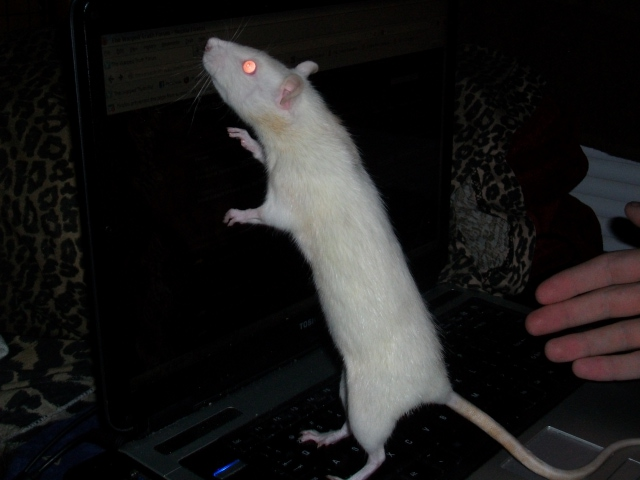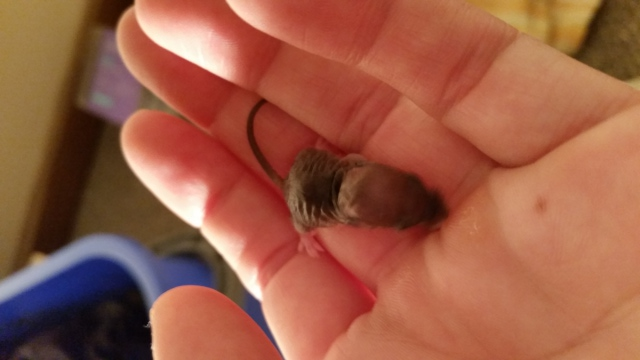QuestionQUESTION: Janell,
I have two 1 1/2 year old female rats that I adopted about a week ago. Their previous owner said one of them had spotted blood recently and she checked them for wounds and found nothing. I just noticed more blood in their cage and I'm hoping you can help me figure out what is going on. Can female rats spot blood? Do they menstruate as we know it? I looks sprayed, not dropped. One of the two does seem a little lethargic but I don't know their personalities well enough yet to judge.
Any help you can give would be appreciated.
Thank you!
ANSWER: If the blood looks spattered, are you positive it's blood and not porphyin?
Porph is, literally, rat snot - it's red tinged and when sneezed or coughed out, looks like blood spatter. This is indicative of a respiratory infection or respiratory issue in general and should be checked out by a vet.
Rats do not menstruate as humans do and they should not bleed vaginally - to bleed vaginally indicates a uterine or bladder infection that needs pretty much immediate treatment. But you said it was spatter, which to me means check the lungs. Does she sound wheezy/raspy/congested at all?
---------- FOLLOW-UP ----------
QUESTION: Janell,
Thanks for your prompt reply. Porph is probably the correct diagnosis as I didn't see any blood around the vaginal area and the splatter I saw matches your description. I have two rats and I'm not sure which it came from but one seems more lethargic and glassy eyed than the other. How did she get this? What is the treatment? Is there a chance my other rat will catch it as they share a cage?
Thank you,
Kelley
AnswerJust like a runny nose in a person, porphyrin is usually a symptom of something else - in this case, given her age, it could be something as simple as a mycoplasmosis flare up. Mycoplasmosis (or "Myco"), is a disease - organism rather - that all rats are born with. It lays dormant until a weakening in the immune system allows it to become active, causing the famous respiratory symptoms rat lovers are all too familiar with. From what I've dealt with, about 90% of respiratory cases are directly related to myco. Some rats just porph because they happen to be a little more snotty than others - if they're acting totally healthy, it's not an issue.. but that doesn't sound like the case here.
I'd be willing to bet it's the lethargic/glassy-eyed girl who's getting sick on you. Do you have a vet at your disposal? He (or She) would be able to give you a thorough examination and determine what the best course of treatment is, but my guess is that it'll be tetracycline or sulfa-drug for 7 to 10 days - or if severe enough, baytril and/or doxycycline. If this is in fact myco, baytril/doxy combo is the sure way to beat it down - myco has no cell wall and does not respond to basic broad spectrum antibiotics. Any vet who knows rats will know this and be able to make an informed decision based on what he hears in her lungs. He/she may choose to treat both rats depending on what they feel may be wrong with her - myco itself isn't contagious, but if a bacterium or virus other than myco is to blame, they both could have it. Myco can never be cured, just treated; and meds will need to be administered every time a flare up occurs. Myco causes scarring in the lungs, and in this sense, you can think of it like tuberculosis - it causes 'tubers' to form and fill with fluid. The more attacks that happen without prompt and immediate treatment, the more her lungs scar and the harder she has to work to breathe. Catching it early is the key.
Try offering them vitamin c in the form of rose hips or peeled oranges as an immuno boost, and if the lethargic rat's breathing gets severely labored, a cool mist humidifier may help a load also. What sort of bedding are they on? Remember that Pine and Cedar are NOT healthy and only aspen or hemp should be used - or a recycled newspaper pellet/shaving, if applicable. Some forego bedding altogether and use papertowels or terrycloth. Both are viable alternatives. Keeping the cage clean and the diet healthy will also help prevent issues in the future.
I hope that helps some! Let me know if there's anything I missed or if you need any other help --
Janell

 rat tail /skin problem
Question
tail bump skin problem
my rat has
rat tail /skin problem
Question
tail bump skin problem
my rat has
 small red bubble on face
QuestionQUESTION: hi my rat has a small red bubble like
small red bubble on face
QuestionQUESTION: hi my rat has a small red bubble like
 My rat has a lump...
QuestionClangers Lump
QUESTION: I understand you
My rat has a lump...
QuestionClangers Lump
QUESTION: I understand you
 Rat behaviors.
Question
Cricket Playing
A little background: Al
Rat behaviors.
Question
Cricket Playing
A little background: Al
 newborn rat/mice
Question
dehydrated baby Mouse or rat
HI I
newborn rat/mice
Question
dehydrated baby Mouse or rat
HI I